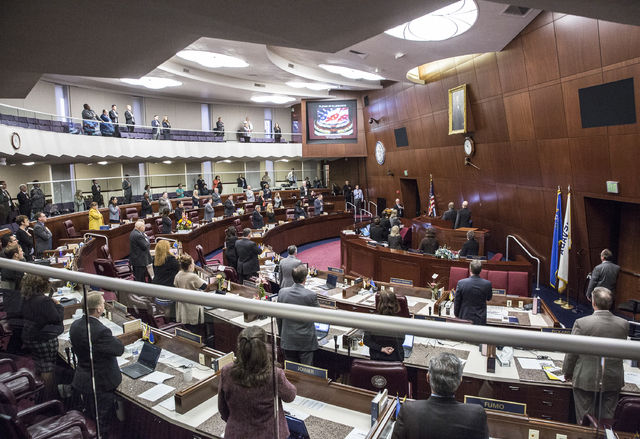More than 200 bills head to Nevada Legislature graveyard
CARSON CITY — Hundreds of bills have died in the Nevada Legislature this session, impacting everything from the fish pedicure industry to inmates on death row.
Some bills packed committee hearing rooms; others never even got a hearing. In all, 246 bills and 10 resolutions failed to get passed by a committee vote last week and missed a key deadline needed for survival.
Here are some of the bills that died:
- Gambling age: Sorry youngsters, but the gambling age won’t be lowered to 18. Assembly Bill 86 would lowered the minimum gambling age from 21 to 18.
- Labor changes: Assembly Bill 121 would have kept salary raises in place for government employees when union contracts expire and until a new labor agreement is reached. It also would have made new pay raises retroactive.
- Fish pedicures: You can get a lot of things in Nevada, but not a fish pedicure. Assembly Bill 158 would have required the State Board of Cosmetology to allow fish pedicures, a treatment in which fish eat the dead skin off of feet that is popular in Asia.
- Death penalty: Assembly Bill 237 would have abolished the death penalty, but the bill died without a vote. Even so, inmates are rarely put to death in Nevada. The state has not executed an inmate since 2006.
- Presidential preference primary: Nevada’s caucus system used to pick presidential nominees will stay intact. Assembly Bill 293 would have allowed political parties to have presidential primaries instead.
- Plastic bags: They’re here to stay and free to use for the foreseeable future. Assembly Bill 344 would have impose a 10-cent charge on plastic bags through Dec. 2021, with a total ban on plastic bags at stores starting in 2022.
- School board trustees: School boards, including Clark County School District’s board, will have the same composition of elected officials. Senate Bills 243 and 381, which would have made some board members appointed instead of elected, died. Neither bill, both of which were sponsored by Senate Minority Leader Michael Roberson, got a hearing.
- Recess: Remember recess in the school yard? The state will not force it to return. Assembly Bill 166 would have required at least 30 minutes of recess for youngsters in kindergarten through fifth grade.
- Microchips: The government will not be barred from forcing microchips into people. Senate Bill 109 would have forbidden the government or any other people from requiring microchip implantation in people.
- Immigration: Assembly Bill 357 and Senate Bill 223, both would have put restrictions in place barring local and state law enforcement agencies from immigration enforcement — even detaining a person for federal immigration authorities to pick up.
- Public records: Accessing public records won’t get easier. Senate Bill was opposed fiercely by government-paid lobbyists. The bill would have required government agencies unable to provide a record within five business days to provide it within 15 or 35 days. Current law gives no deadline beyond five days.
Contact Ben Botkin at bbotkin@reviewjournal.com or 775-461-0661. Follow @BenBotkin1 on Twitter.
Resolutions that died
Resolutions are different from bills and can do things like send a message to Congress or send a proposed amendment to the Nevada Constitution to voters for approval.
For a list of all bills and resolutions that died, visit https://www.leg.state.nv.us.
Among the 10 resolutions that died:
- Assembly Joint Resolution 1, which sought to amend the Nevada Constitution so voters would need to approve any changes to the commerce tax that decrease the amount of gross revenue that's exempt.
- Assembly Joint Resolution 3, which would have recognized the Legislature's support for Israel.
- Assembly Joint Resolution 6, which proposed amending the Nevada Constitution to abolish the Office of State Controller and Office of State Treasurer.
- Assembly Joint Resolution 12, which would have urged Congress to abolish the Gold Butte National Monument.






















